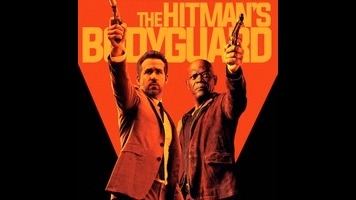Samuel L. Jackson and Ryan Reynolds sneak only a little fun into The Hitman’s Bodyguard

The Hitman’s Bodyguard, which bears the tagline “Get triggered” and is essentially a dumber, tackier Midnight Run, was destined to be one of those Neanderthalic, faux-merican EuropaCorp action movies, like The Transporter or From Paris With Love—except fate fumbled, and the film ended up as a coasting-on-star-power Hollywood programmer directed by The Expendables 3’s Patrick Hughes. At least it manages to be sort of amusing. Ryan Reynolds plays the Robert De Niro role, only instead of being a prickly, Sinatra-belting bail bondsman and former Chicago cop who’s still hung up on his ex-wife, he’s a finicky, Ace Of Base-yodeling bodyguard-for-hire and former CIA agent (aren’t they all?) who’s still hung up on his ex-girlfriend. We’re introduced to him living in one of those glass modernist shoeboxes that all of today’s elite big-screen gunmen seem to live in, until one pesky sniper round to a tycoon’s forehead downgrades him to babysitting drug-addled fugitive bankers. The Charles Grodin role—at least narratively, since the character dynamics are reversed—is in turn filled by Samuel L. Jackson, whose character isn’t a mob accountant with a five-day bond forfeiture deadline in Los Angeles, but a world-class contract killer who has less than 24 hours to get to the International Criminal Court in The Hague.
Reynolds’ Michael Bryce picks Jackson’s character, Kincaid, up from a safe house in London, called in by the aforementioned ex, an Interpol agent named Amelie Roussel (Elodie Yung). She’s run out of ideas after being ambushed by the henchmen of the guy Kincaid is supposed to testify against, Vladislav Dukhovich (Gary Oldman, with bifocals and Jeff Bridges hair), the fictional dictator of the very real country of Belarus. (Let’s just say that the script presumes viewer ignorance in subjects of geography, geopolitics, etc.) The testimony is part of a deal to free Kincaid’s ferocious wife, Sonia (Salma Hayek), and… yada yada yada. Like basically every genre movie that makes its way through today’s Hollywood production machine, The Hitman’s Bodyguard has about five times as much backstory as it needs, as if getting shot at weren’t enough motivation. But Reynolds and Jackson have a very good onscreen rapport, with the former playing the high-strung and smug foil to the latter’s unflappable, no-remorse asshole. Kincaid and Bryce have some history together—enough to try to kill each other the moment they meet in the safe house—but it doesn’t have much bearing on the characterizations. They’re two wise-asses—wise-asses who are just like the other wise-assses the actors have played before—stuck together on a road trip in a series of stolen compact cars, ribbing each other and telling stories that Hughes illustrates as stylized, grindhouse-grainy, slow-motion flashbacks.
Or at least that’s what it’s like whenever The Hitman’s Bodyguard isn’t pulling out another breathlessly uninvolving action sequence. Again and again, the stars’ stunt doubles rip vehicular mayhem through what direct-to-video action buffs will undoubtedly recognize as the forests of western Bulgaria. Hughes really can’t visualize fast, coordinated action in distinct images (his style is “coverage of stunts from different angles”), and it mixes poorly with the film’s crappy special effects. There’s a shockingly gruesome fight between Bryce and a Dukhovich goon in a Dutch hardware store that’s composited to look like a single take, but instead of something like the grisly long take in David Leitch’s recent Atomic Blonde, it comes out as a series of choppy close-ups that have been impatiently glued together. Studio-backed productions have less variety than ever, so it’s not uncommon to watch a movie where almost everyone involved seems like they wish they were working on something else. That’s all too true here—from Jules O’Loughlin’s overcompensating, thickly diffused cinematography to Atli Örvarsson’s busy, spy-movie score. Hughes shows a surprising ease with visual gags and punchlines, especially in the movie’s more clearly organized first act; perhaps he’s wasting his time as an action journeyman. In fact, the only ones who seem to be truly enjoying themselves are Jackson and Reynolds—even during the boring parts where they have to talk about their feelings.